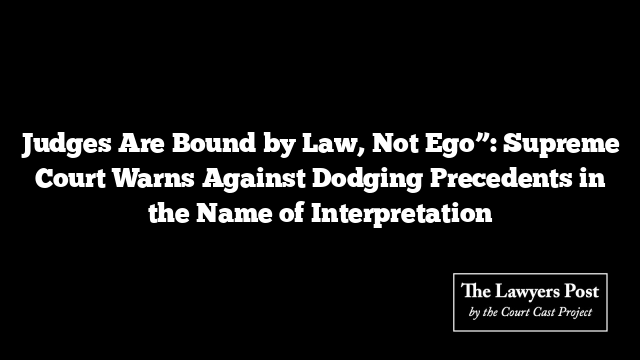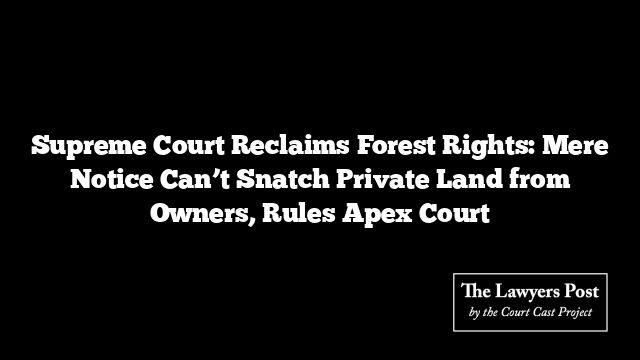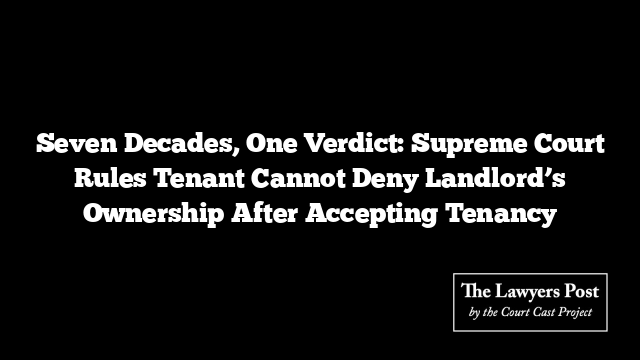In a sharp reminder that the judiciary’s power flows from discipline, not defiance, the Supreme Court has cautioned all courts against side-stepping binding precedents under the guise of distinction. The bench declared that adherence to settled law is not optional — it is a constitutional command.
“The duty of every court is plain: apply precedent as it stands, and obey appellate directions as they are written. In that discipline lies the confidence of litigants and the credibility of justice,” the Court observed, asserting that judicial hierarchy is the backbone of constitutional order.
A bench of Justices Vikram Nath and Prasanna B. Varale underscored that Articles 141 and 144 of the Constitution are not ceremonial clauses but binding obligations — ensuring that every authority and court in India acts in aid of the Supreme Court’s pronouncements.
“The Constitution does not create competing fiefdoms of power. It establishes a single system of justice, coherent and credible, that speaks through one voice — the rule of law,” the Court noted.
Judicial Defiance Is Judicial Decay
The Court issued a clear warning that evasion or resistance by subordinate courts not only defies constitutional structure but corrodes public faith in justice. “When a superior court reverses, modifies, or remands, the lower court must give full and faithful effect to that decision,” the bench said.
Citing the maxim interest reipublicae ut sit finis litium — it is in the public interest that litigation must end — the judgment stressed that finality from the apex court “is the glue that holds the entire judicial edifice together.”
Justice Nath, authoring the verdict, described judicial discipline as “the ethic that turns hierarchy into harmony.” A judge, he said, must obey precedent even when personally unconvinced, for discipline is not subservience — it is the price of legitimacy.
The Right Way to Dissent
If a judge believes a precedent needs reconsideration, the Court said, the only lawful path is to apply it faithfully and record reasons to refer the matter to a larger bench — not to circumvent it by wordplay or narrow interpretation.
Reinforcing the principle of stare decisis, the bench observed, “To stand by what is settled is not an empty ritual but a safeguard of equality before the law.”
Judges Do Not Wage Battles
The Court reminded the judiciary that “judges do not sit to settle scores; the gavel is an instrument of reason, not a weapon of reprisal.” Personal pride, the Court warned, has no place in a system governed by law and not personalities.
Collegiality, the judgment said, is the “companion virtue of independence,” and reversals on appeal must never be seen as affronts but as part of a constitutional process that refines and settles the law.
Respect Without Subservience
“Respect for senior jurisdiction is not servility,” the Court declared. “It is the recognition that every court, from the smallest tribunal to the highest bench, shares a single purpose — to do justice according to law.”
The Court emphasised that judgments must speak through reasons rooted in binding authority, warning that deviations fracture the unity of law and burden citizens with uncertainty and expense.
These stern observations came as the Supreme Court allowed a batch of 96 civil appeals, setting aside a Bombay High Court ruling that had treated private lands as vested forests under the Maharashtra Private Forests (Acquisition) Act, 1975.
The bench found that the High Court had misread draft Gazette entries and treated clerical mutation records as conferring ownership — a legal misstep contrary to the binding precedent in Godrej & Boyce Manufacturing Co. Ltd. v. State of Maharashtra.
Reaffirming that judicial discipline is the cornerstone of a trustworthy system, the Court concluded: “The unity of law depends on the humility of its interpreters.”





